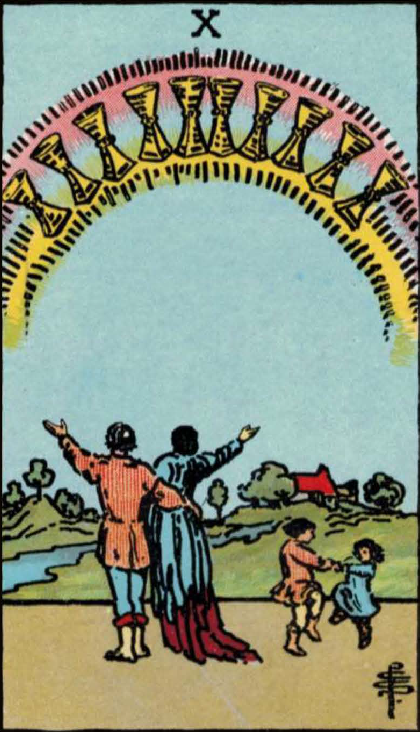The Ten of Cups Tarot Card: Symbolism, History, and Meaning
The Ten of Cups tarot card is one of the most positive and harmonious cards in the tarot deck. Embodying unity, peace, and ultimate emotional fulfillment, The Ten of Cups illustrates the joy of familial love and the happiness that comes from emotional contentment. In this comprehensive guide, we delve into the historical origins, symbolism, and meanings of this heartwarming card, offering valuable insights for your tarot readings.
The Historical Origins of The Ten of Cups Tarot Card
The Ten of Cups, belonging to the Cups suit in the Minor Arcana, originated in tarot decks of the mid-15th century, originally used for games such as tarocchi. The Cups suit was frequently associated with emotions, relationships, and the spiritual realm.
As the use of tarot evolved for divination around the 18th century, the Ten of Cups came to symbolize complete emotional satisfaction, familial harmony, and blissful relationships. Today, it represents the pinnacle of emotional fulfillment and the happiness derived from shared love and peace.
A Vivid Description of The Ten of Cups Tarot Card
The Ten of Cups often portrays a joyous scene featuring a man and woman, arms stretched towards the sky in celebration or gratitude. Nearby, two children are seen playing, further enhancing the sense of family and joyous connection. The couple's open arms can symbolize openness and fulfillment, while the children symbolize innocence and happiness.
Above them, a rainbow filled with ten cups spans the sky. In many cultures, rainbows are seen as symbols of hope, promise, and fulfillment. The cups within the rainbow are arranged in an arc, mirroring the rainbow's shape and reinforcing the symbolism of complete emotional fulfillment.
In the background, a comfortable home is nestled among green trees and beside a flowing river. The house often represents comfort, security, and joy in personal life. The river flowing smoothly symbolizes peace and harmony, while the green landscape symbolizes fertility and abundance.
The sky is clear and bright, reflecting the overall joyous and peaceful sentiment of the card.
The Rich Symbolism of The Ten of Cups Tarot Card
The Ten of Cups tarot card is packed with symbolism, each element shedding light on a different aspect:
The Happy Family: Represents unity, shared happiness, and the joy derived from loving relationships.
The Rainbow and Ten Cups: Symbolize emotional abundance and the culmination of a journey towards emotional fulfillment.
The Raised Arms: Signify celebration, gratitude, and the acceptance of life's blessings.
The Playing Children: Denote innocence, harmony, and the simple joys of life.
The Profound Meanings of The Ten of Cups Tarot Card
When The Ten of Cups appears in a tarot reading, it typically symbolizes harmony, peace, and familial happiness. It encourages appreciation of the love and joy present in one's life and signifies a time of emotional fulfillment.
Upright, The Ten of Cups indicates a harmonious family, a sense of togetherness, and shared love and happiness. It suggests a period of peace and contentment, the achievement of emotional desires, and the importance of family and community.
In a reversed position, The Ten of Cups might suggest a disruption of harmony or struggles within a family. It could be a call to resolve conflict, foster unity, and reestablish peace.
Final Thoughts on The Ten of Cups Tarot Card
The Ten of Cups tarot card carries an uplifting message of unity, familial love, and emotional fulfillment. Its rich history and vibrant symbolism offer deep insights into the joys of shared happiness and the tranquility that comes from emotional contentment. Whether you're new to tarot or an experienced reader, understanding The Ten of Cups can enhance your perspective on peace, love, and familial harmony.
Remember, like the joyous family in the card, we all have moments of shared happiness and love in our lives. It's essential to cherish these moments, appreciate the love we share, and maintain peace and unity within our personal communities.
